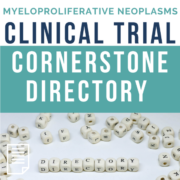What Are Treatment Options for Myelofibrosis?
What Are Treatment Options for Myelofibrosis? from Patient Empowerment Network on Vimeo.
MPN specialist Dr. Abdulraheem Yacoub shares and overview of treatment options, including therapies in development, for patients living with myelofibrosis (MF).
Dr. Abdulraheem Yacoub is a hematologist oncologist at the University of Kansas Cancer Center. Dr. Yacoub is an active researcher and is an Associate Professor of Hematologic Malignancies and Cellular Therapeutics. Learn more about Dr. Yacoub, here.
Related Programs:

|

|

How Should You Participate in MPN Care and Treatment Decisions? |
Transcript:
Katherine:
And since myelofibrosis is a progressive condition, I imagine it’s more difficult to manage. So, what else is available for patients with myelofibrosis?
Dr. Yacoub:
Correct So, myelofibrosis is the higher end of this spectrum of cancers.
It is a cancer that is associated with much higher symptom burden and impact on daily life. It is also associated with low blood counts, and some patients will require transfusions. It’s a major morbidity to our patients. And in addition, it’s a cancer that is associated with shortened life. So, patients with myelofibrosis will not live as long as their health would have allowed them. And some of them will live actually a much shorter life than they want or deserve.
So, myelofibrosis treatment requires a lot more considerations. So, for patients who are in good health, who have a cancer that is more aggressive, that would be imminently impacting their longevity, we start a discussion about a curative role of allogeneic stem cell transplantation very early in their course.
Because bone marrow transplantation can be curative, and those patients can live a long life after a successful transplant. So, this is a treatment modality that should be brought up very early for patients with higher risk myelofibrosis. There are approved JAK inhibitors, ruxolitinib (Jakafi) and fedratinib (Inrebic). And we know that ruxolitinib which has been approved for over 10 years can improve symptoms, can improve the spleen volume, can actually prolong lives for patients on it, and also makes the transplant more successful.
So, we should be offering that to the appropriate patients also early in their diagnosis, in a strategy where, in addition to that, we get them to a transplant. Fedratinib is approved in that setting. And we are very optimistic that by the end of this calendar year, we will have two other JAK inhibitors approved.
[Editor’s Note: As of February 28, 2022, pacritinib (Vonjo) has been approved for the treatment of myelofibrosis patients with severe thrombocytopenia.]
So, we look forward to those two drugs. Momelotinib and pacritinib for patients with special disease features. And hopefully, by the end of this year, we will have a list of JAK inhibitors that we can choose from, which is great news for our patients.
Katherine:
Oh, we’re still fighting.
Dr. Yacoub:
Yes, absolutely.










